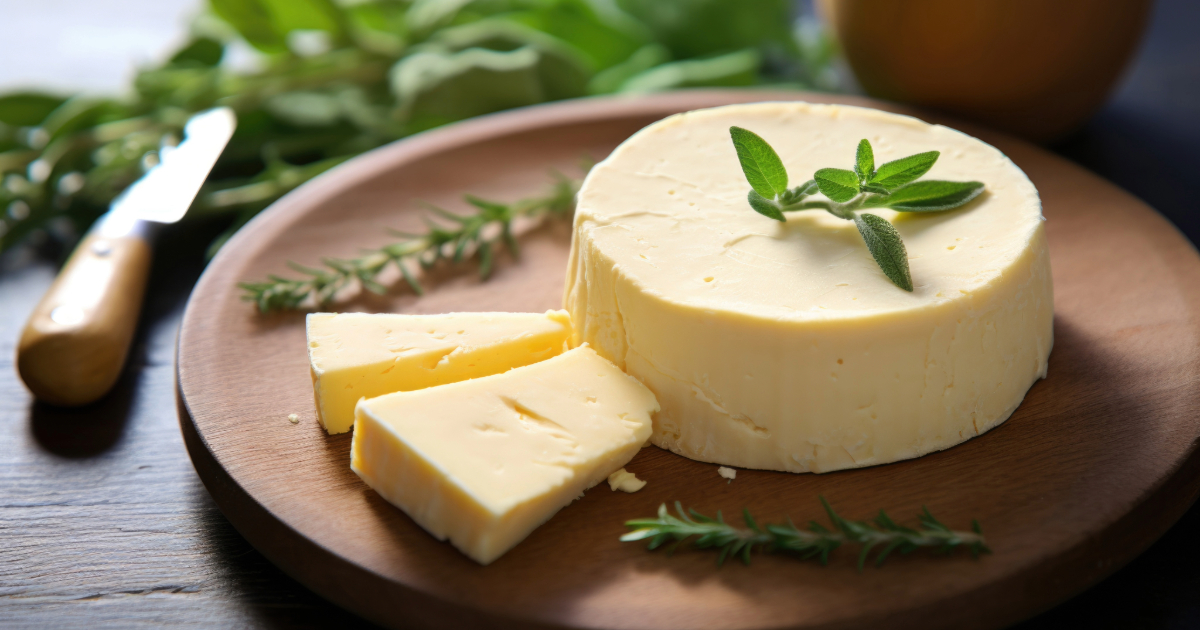Vegan cheese has become increasingly popular in recent years as more people adopt plant-based diets.

But what exactly is vegan cheese made of? How does it taste compared to regular dairy cheese? And what are some of the best brands to try?
What Ingredients Are Used to Make Vegan Cheese?
There is no single recipe for vegan cheese. Different brands use various plant-based ingredients to create the texture and flavor of dairy cheese without using any animal products.
Here are some of the most common ingredients found in vegan cheeses:
- Nuts - Cashews, almonds, and macadamia nuts are often used to make creamy vegan cheeses. The nuts are soaked, blended, and fermented to mimic the texture of dairy cheese.
- Coconut oil - Added for creaminess and to help vegan cheese melt.
- Nutritional yeast - Gives vegan cheese a cheesy umami flavor.
- Starches - Tapioca starch, potato starch, and corn starch help improve the texture.
- Soy - Soy milk and tofu can be used to make some vegan cheeses.
- Seeds - Sunflower, pumpkin, and sesame seeds are sometimes used.
- Probiotics - Bacterial cultures are added during fermentation for flavor and health benefits.
- Thickeners - Agar-agar, carrageenan, xanthan gum, and pectin give a thicker, stretchier texture.
- Acids - Lemon juice, apple cider vinegar, etc. are used to culture the cheese.
Vegan cheeses are made by blending plant-based fats, proteins, and thickeners, then allowing microbial cultures to ferment the mixture to develop a complex, cheese-like flavor.
Key Takeaway: Vegan cheeses are made from ingredients like nuts, coconut oil, starches, and probiotics that mimic the texture and taste of dairy cheese.
How is Vegan Cheese Made?
The process of making vegan cheese is similar to traditional cheesemaking, but without the animal milk. Here are the basic steps:
1. Mix Base Ingredients
The plant-based proteins, fats, starches, and any flavorings are blended together into a homogeneous mixture. For example, soaked cashews might be combined with coconut oil, tapioca starch, salt, garlic powder, and nutritional yeast.
2. Culture
Probiotic cultures are added to ferment the mixture. This could include plant-based yogurt, kombucha, sauerkraut juice, rejuvelac, or vegan cheese starter cultures. The cultures break down proteins and starches to develop complex flavors.
3. Rest
The mixture rests for several hours to days, allowing the cultures time to acidify and transform the ingredients. Just like dairy cheese, this aging is key for full flavor development.
4. Shape and Coat
The cultured cheese mixture is shaped into blocks, rounds, or shreds. It can be coated in herbs, spices, or ash for added flavor and appearance.
5. Age
The shaped cheese is aged in temperature and humidity controlled environments. This allows further microbial fermentation and acidification. Aging time ranges from a few weeks for soft cheeses to several months for firm, aged varieties.
So in summary, vegan cheese production relies on culturing and aging plant-based ingredients to achieve the characteristic texture and robust flavors we expect from good cheese. Patience is required, but the end result can mimic dairy very closely.
Does Vegan Cheese Taste Like Regular Cheese?
There is a wide range in flavor and texture between different vegan cheese brands and types. Here are some generalizations of how vegan cheese compares to dairy cheese:
- Soft fresh cheeses - Cream cheese, mozzarella, ricotta, and goat cheese alternatives often come very close to the real thing in terms of creamy, mild taste.
- Aged hard cheeses - Vegan parmesan and cheddar can mimic the sharp, tangy flavor of their dairy counterparts quite well if aged for long enough. They are less likely to melt smoothly though.
- Texture - Vegan cheese tends to be more porous and break apart easier when cooked compared to the stretchy melt of real dairy cheese. But new techniques are improving the meltability.
- Appearance - Many brands are colored and shaped to look identical to traditional cheeses. But the interior of vegan cheese is often softer and less rigid.
- Smell - Depending on the cultures and ingredients used, vegan cheese can have very similar aromas to dairy cheese.
So while vegan cheese may not be identical, it can come pretty close to satisfying cheese cravings for many people. The flavor and texture continues to improve as companies innovate with new ingredients and production methods.
Is Vegan Cheese Healthy?
Vegan cheese can be part of a healthy diet, but pay attention to sodium and processed ingredients:
- Saturated Fat - Vegan cheese is lower in saturated fat on average than dairy cheese. But coconut oil-based cheeses can still be high in saturated fat.
- Sodium - Check the label, as some brands add a lot of salt. Try to choose options with less than 300mg sodium per serving.
- Nutrients - Vegan cheeses offer little protein or calcium compared to dairy cheese. Look for added B12 and vitamin D.
- Ingredients - Some overly processed vegan cheeses contain questionable thickeners and emulsifiers. Choose simple, recognizable ingredients when possible.
- Allergens - Many varieties are allergy-friendly, avoiding common allergens like dairy, gluten, tree nuts, and soy. But always check labels carefully for your individual needs.
Overall, vegan cheese can be enjoyed as an occasional treat within a healthy vegan diet focused on whole, minimally processed foods. Moderation is key, like any food.
What Are the Best Brands of Vegan Cheese?
There are tons of vegan cheese brands on the market now, with more popping up every day. Here are some of the most popular and reputable vegan cheese producers:
| Brand | Description |
|---|---|
| Miyoko's | Known for extremely realistic aged cheeses like camembert and cheddar using cultured cashew milk. |
| Kite Hill | Specializes in soft fresh cheeses like cream cheese, ricotta, and ravioli with almond milk. |
| Treeline | Aged nut-based soft cheeses like french-style and herb-garlic flavors. |
| Violife | Convincing shreds and blocks using coconut oil. Good for melting. |
| Daiya | Shreds, slices, and cream cheese alternatives without soy or nuts. |
| Field Roast Chao Slices | Coconut oil-based slices for melting on sandwiches and burgers. |
| Follow Your Heart | Large selection of shredded, sliced, and block cheeses. |
| Parmela Creamery | Aged nut-based parmesan alternative with authentic crystalline texture. |
Try a few different vegan cheese styles and brands to find your favorites. The variety available now means you can likely find a vegan cheese suitable for any recipe or application.
FAQs
Is vegan cheese made from milk?
No, vegan cheese never contains animal milk. It is made using plant-based ingredients only.
Why is vegan cheese so expensive?
The process to make convincing vegan cheese is labor and time intensive, so it costs more to produce than traditional cheese in most cases. But prices are coming down as manufacturing scales up.
Can you melt vegan cheese?
Some vegan cheeses melt very similarly to dairy cheese, especially when they contain coconut or soybean oil. But the meltability varies widely by brand, so you may need to experiment to find one you like for melted applications.
Is vegan cheese bad for you?
Vegan cheese can be part of a healthy diet in moderation, but should be considered a treat food rather than a health food. Check labels for high sodium, saturated fat, and overly processed ingredients.
Does vegan cheese taste like real cheese?
It varies quite a bit by brand and type of cheese. Some products come extremely close to mimicking the taste, texture, and melting properties of dairy cheese. The flavor profile continues to improve as vegan cheesemaking technology evolves.
What can I replace cheese with if I don't want vegan cheese?
Some whole food alternatives include mashed avocado, hummus, roasted cauliflower, cashew cream sauces, bean spreads, blended tofu, sunflower seed butter, or nutritional yeast sprinkled on dishes.
Conclusion
Vegan cheese has made huge advances in recent years in terms of high quality plant-based ingredients, realistic textures, full flavor profiles, and increased accessibility in mainstream supermarkets.
While it may not be a health food, vegan cheese provides a convenient way for vegans, vegetarians, and flexitarians to enjoy the foods they love while avoiding animal products and allergens.
With such a huge variety of brands and cheese styles now available, there's practically no excuse to not go dairy-free.
Even just making small swaps from dairy to vegan cheese can dramatically reduce your environmental footprint and suffering caused to animals.

